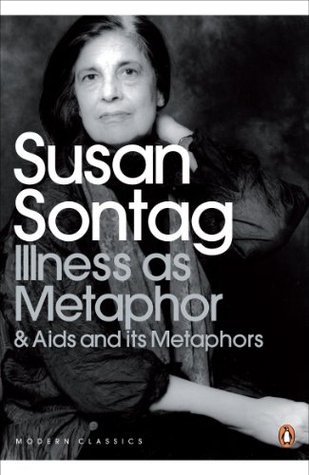More on this book
Community
Kindle Notes & Highlights
by
Susan Sontag
Read between
January 8 - May 30, 2022
Everyone who is born holds dual citizenship, in the kingdom of the well and in the kingdom of the sick.
the healthiest way of being ill – is one most purified of, most resistant to, metaphoric thinking.
The solution is hardly to stop telling cancer patients the truth, but to rectify the conception of the disease, to de-mythicize it.
All this lying to and by cancer patients is a measure of how much harder it has become in advanced industrial societies to come to terms with death.
It was equally possible, through fantasies about TB, to aestheticize death.
Punitive notions of disease have a long history, and such notions are particularly active with cancer. There is the ‘fight’ or ‘crusade’ against cancer; cancer is the ‘killer’ disease; people who have cancer are ‘cancer victims.’
Nothing is more punitive than to give a disease a meaning – that meaning being invariably a moralistic one. Any important disease whose causality is murky, and for which treatment is ineffectual, tends to be awash in significance.
The military metaphor in medicine first came into wide use in the 1880s, with the identification of bacteria as agents of disease. Bacteria were said to ‘invade’ or ‘infiltrate.’ But talk of siege and war to describe disease now has, with cancer, a striking literalness and authority.
Illnesses have always been used as metaphors to enliven charges that a society was corrupt or unjust.
Modern disease metaphors specify an ideal of society’s well-being,
Modern totalitarian movements, whether of the right or of the left, have been peculiarly – and revealingly – inclined to use disease imagery.
To describe a phenomenon as a cancer is an incitement to violence.
The use of cancer in political discourse encourages fatalism
Abuse of the military metaphor may be inevitable in a capitalist society, a society that increasingly restricts the scope and credibility of appeals to ethical principle, in which it is thought foolish not to subject one’s actions to the calculus of self-interest and profitability.
War-making is one of the few activities that people are not supposed to view ‘realistically’; that is, with an eye to expense and practical outcome. In all-out war, expenditure is all-out, unprudent – war being defined as an emergency in which no sacrifice is excessive.
the attribution of fault to the patient is an inevitable one, no matter if patients are thought of as victims. Victims suggest innocence. And innocence, by the inexorable logic that governs all relational terms, suggests guilt.
Military metaphors contribute to the stigmatizing of certain illnesses and, by extension, of those who are ill.
the metaphoric trappings that deform the experience of having cancer have very real consequences: they inhibit people from seeking treatment early enough, or from making a greater effort to get competent treatment.
With the most up-to-date biomedical testing, it is possible to create a new class of lifetime pariahs, the future ill.
Etymologically, patient means sufferer. It is not suffering as such that is most deeply feared but suffering that degrades.
The most terrifying illnesses are those perceived not just as lethal but as dehumanizing, literally so. What was expressed in the rabies phobia of nineteenth-century France, with its countless pseudo-cases of contamination by animals newly turned ‘bestial’ and even of ‘spontaneous’ rabies (actual cases of rabies, la rage, were extremely rare), was the fantasy that infection transformed people into maddened animals
Authoritarian political ideologies have a vested interest in promoting fear, a sense of the imminence of takeover by aliens – and real diseases are useful material.


